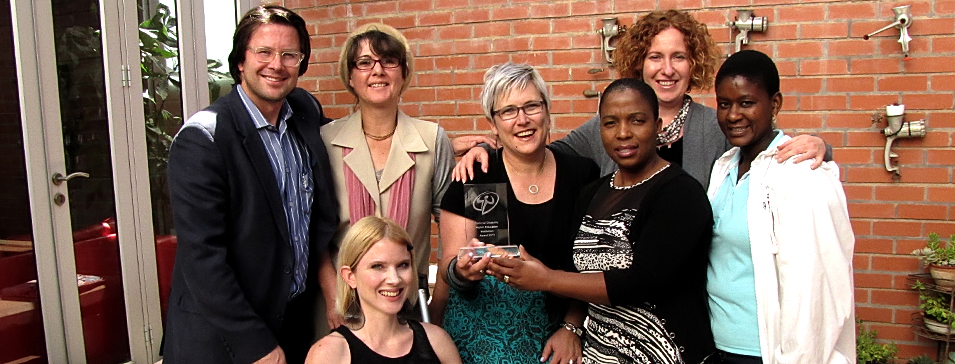Latest News Archive
Please select Category, Year, and then Month to display items
12 January 2024
|
Story Nonsindiswe Qwabe
|
Photo Sonia Small
 Since joining the UFS in 2008, Dr Grey Magaiza has worked extensively on approaches that can foster the socio-economic transformation of societies.
Since joining the UFS in 2008, Dr Grey Magaiza has worked extensively on approaches that can foster the socio-economic transformation of societies.
“The future should be one where communities can decide on their development agenda and futures. That’s the most important for me.” Dr Grey Magaiza, Deputy Director of the Centre for Gender and Africa Studies (CGAS) and Head of the Community Development programme on the Qwaqwa Campus, is passionate about capacitating communities to be agents of change and advancement. His vision for the future emphasises the empowerment of communities to take charge of their development by actively participating in decision making and the implementation of development projects that can improve their lives.
Since joining the UFS in 2008, Dr Magaiza has worked extensively on approaches that can foster the socio-economic transformation of societies. Over the years, he has crafted his research speciality into one that he is most proud of – being an interdisciplinary scientist immersed in the development of communities.
“I’m in a fortunate position of researching what I like. I say ‘fortunate’, because I’ve taken the time to understand what I’m passionate about, which is the overall field of rural livelihoods and livelihood futures – in short, community development. My research starts from an engaged university, understanding the elements that a university must use to enhance transformation and relevance to its immediate community in terms of development.”
One of the ways he has done this is by looking at social entrepreneurship as a development approach for young people in a rural setting. Through workshops with non-profit and civic organisations in Qwaqwa, Dr Magaiza has been helping these organisations to map out their needs and actively meet them through the involvement and support of external role players.
“We understand that communities are part of the national development agenda, but even that national agenda respects community knowledge and intentions and allows communities to shape their identity. A critical enabler of this is community organising. You bring back the capacity in communities to have dialogues on issues affecting them as spaces for engagement, knowledge exchange, and for people to just talk about their way forward.”
By enabling communities to define their development agenda, they can address their specific needs, challenges, and aspirations, he said. “When I look at livelihood futures, it’s quite an exciting aspect of my work – it’s like looking into a fortune tellers’ globe, because you’re not deciding for communities what they should do, but the communities themselves take those decisions.”
University recognised as leading Higher Education Institution for students with disabilities
2013-12-05
 |
The University of the Free State has been lauded for creating an inclusive environment for persons with disabilities, winning the 2013 National Disability Higher Education Institution Award. The award was presented at the National Disabilities Awards held in Port Elizabeth as part of the celebrations for International Day of People with Disabilities.
The Deputy Minister for Women, Children and People with Disabilities, Hendrietta Ipeleng Bogopane-Zulu, commended the university during the event for standing out among South African institutes of higher education. She told the audience the award gives recognition to institutions that demonstrate, through their strategy and policy, the provision of an inclusive environment for persons with disabilities. This is done through the use of technology and accessibility at their premises.
It's not the first time the university received praise from the deputy minister. In 2012 she visited the Bloemfontein Campus as part of a nation-wide roadshow to assess disability compliance and support services at all universities and FET colleges. Impressed with the work of the Unit for Students with Disabilities (USD), she recommended that staff from various higher education institutions visit the campus to gain insight into what they are doing.
Receiving the award on behalf of the university, Hetsie Veitch, Director of the USD, says the award recognises the commitment of the university’s senior leadership, who support the USD in creating a learning environment that is welcoming and accessible to all students.
Rudi Buys, Dean of Student Affairs, says the university is appreciative of what the USD does and says the award is a great achievement for a unit that only started functioning on its own three years ago. “The role of our support unit for Students with Disabilities has since 2010 grown to hold not only a prominent place in our institutional reflection on and implementation of approaches of universal access, but also to stand as leading department in building and bearing witness to the commitment of the UFS to values of universal access.”